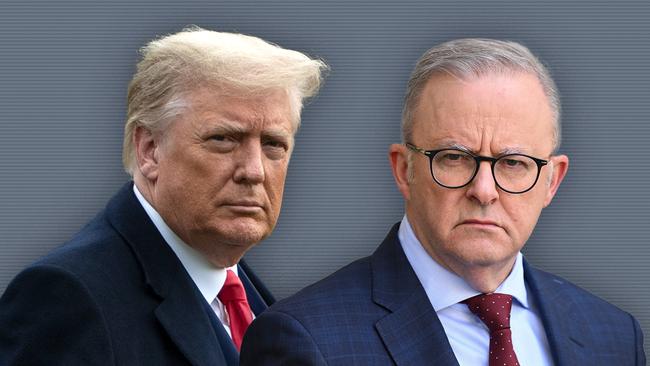With deal done on subs, hitting an ally where it hurts would never float … but this is Donald Trump


His threatened 25 per cent tariff on Australian steel and aluminium imports should, in any normal world, be a non-starter, given we have a free-trade agreement which works substantially in America’s favour, not to mention the ANZUS alliance, the AUKUS nuclear submarine pact and a century of shared military campaigns.
But no friendship or alliance can be guaranteed under Trump Mark II. Just ask Canada.
Australia will have to scramble fast at the highest level to win the same exemptions on steel and aluminium tariffs as were won in 2018. This will be a critical test of persuasion for Anthony Albanese – who is due to speak with the President on Tuesday – and US ambassador Kevin Rudd.
Until now the signs have been positive – Albanese had an upbeat first phone call with Trump, who claimed Australia’s “perfect relationship” with the US would continue. Rudd also met with Trump and has forged close relationships with numerous senior Republicans. There is no obvious irritant in the relationship.
Much has been written about how well Albanese and Rudd, both former critics of Trump, can work with the President.
But much of this debate has also been unedifying and speculative, driven by conservative ideologues and by Rudd-haters who have tried to score political points regardless of the national interest.
They are misguided because even though Albanese and Rudd are not of Trump’s political stripe in the same way that fellow conservatives Malcolm Turnbull and former ambassador Joe Hockey were, the issue of tariffs and exemptions will be decided by realpolitik arguments, not by personalities or by political differences.
And this time around, Australia has an even more powerful argument than it did in 2018 to justify an exemption from steel and aluminium tariffs.
The critical difference for Australia-US relationship today compared to 2018 is the creation of AUKUS, a pact which Trump is said to support.
Defence Minister Richard Marles has just returned from Washington where he handed over a fat cheque for $800m, the first instalment of a planned $4.8bn investment by Australia to speed up production in America’s nuclear submarine shipyards.
This sort of direct investment in US security is exactly the sort of thing Trump relishes. He loves an ally putting its money where its mouth is and even though Australia’s overall defence spending is lower than Trump would probably like, its planned investment in US submarine production under AUKUS is very real, very direct and clearly plays in Australia’s favour.
Trump is also naturally well disposed towards Australia after travelling the full spectrum in his first term. Trump went from a bad start – where he yelled at Turnbull over the refugee deal in 2017 just days into his presidency – to holding a rare state dinner in Washington for Scott Morrison. Nothing has changed and, indeed, with AUKUS, the relationship has only strengthened further.
The biggest risk for Australia as it seeks an exemption from these tariffs will not be personal clashes or the lack of a strong argument. The biggest risk is that Trump has become so enamoured with tariffs as an instrument of policy that he is willing to levy them across the board indiscriminately, regardless of merit, thereby hitting all countries – including close allies – which export steel and aluminium into the US.
This would mark a different approach by Trump to that during his first term when he selectively handed out exemptions. But already Trump has shown a greater love for tariffs as an instrument of policy in his first month of his second term than he showed during his whole first term. He has already threatened 25 per cent tariffs on Canada, Mexico and Columbia simply to try to secure political outcomes on the border.
He has hit China with a further 10 per cent in tariffs and has promised to levy them soon on the European Union. Trump is in full-scale tariff-mode regardless of the reality that these tariffs will blow back onto Americans in the form of high prices and inflation. All the logic in the world says that tariffs right now on Australian steel and aluminium exports are illogical, counter-productive and grossly unfair given the relationship between the two countries.
But Trump often operates on gut instinct ahead of logic, so all the government can do is put its best foot forward and hope.



We are about to learn exactly what Donald Trump thinks of Australia.